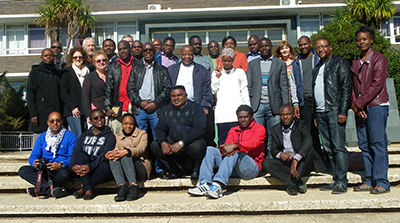Latest News Archive
Please select Category, Year, and then Month to display items
25 March 2024
|
Story Anthony Mthembu
|
Photo Lutendo Mabata
 Prof Nompumelelo Zondi, the newly appointed Vice-Dean: Research and Postgraduate Studies in the Faculty of The Humanities at the University of the Free State (UFS).
Prof Nompumelelo Zondi, the newly appointed Vice-Dean: Research and Postgraduate Studies in the Faculty of The Humanities at the University of the Free State (UFS).
Prof Nompumelelo Zondi has been appointed as Vice-Dean: Research and Postgraduate Studies in the Faculty of The Humanities at the University of the Free State (UFS). Prof Zondi assumed this new role on 1 March 2024 after serving as the Head of Department for African Languages at the University of Pretoria for seven years. “I consider this appointment as an opportunity of growth and learning more about higher education and the Faculty of The Humanities at large,” she said.
Prof Zondi indicates that part of her role is to spearhead the UFS Vision130 within the Faculty of The Humanities, and to ensure that the faculty assists the institution in becoming research-led, student-centred, and globally impactful.
Motivation for assuming this role
One of the primary reasons that led her to consider this role is sharing the knowledge she acquired as part of the Fulbright South African Research Scholar Programme. As a result of that experience and exposure, which went beyond the Ohio State University, she felt it befitting to implement some of the insights she acquired on a bigger scale. Therefore, even though she was impactful in her previous role, Prof Zondi believes that this is an exceptional and more desirable platform to do so. “I feel that I will have easier access to departments within the faculty, while also encouraging and supporting interdepartmental and faculty collaborations,” she explained.
A significant component of Vision 130
He believes that the elements that make up Vision 130 are interrelated. While she considers research central to Vision 130 – as she begins her journey at the UFS, she feels students deserve to be nurtured to further contribute to the university’s impactful research. Thus, student-centredness is the way to go. “I believe that students must be major role players in this Vision130; we must include them in the interactions and discussions that are part of the university’s strategic plan as well as in decision-making processes,” she said. As such, according to Prof Zondi, the more the faculty and the institution care for the students and involve them in Vision130 and in collaborations, the more research outputs the university will achieve.
First CAS Winter School brings researchers together
2016-08-01

International and University of the Free State delegates
during the three day Centre for Africa Studies
winter school.
Photo: Supplied
The first biennial doctoral Winter School by the Centre for Africa Studies at the University of the Free State (UFS) brought together UFS PhD researchers as well as current and new Africa Studies students specialising in the Conflict and Peace subfield.
According to Prof Heidi Hudson, Director of the Centre for Africa Studies, this was the aim of the Winter School, hosted in collaboration with the John and Elnora Ferguson Centre for African Studies (JEFCAS) in the Department of Peace Studies at the University of Bradford in the United Kingdom. The Winter School took place from 18-22 July 2016 on the UFS Bloemfontein Campus.
Doctoral students gain deeper insight during school
Prof Hudson said the Winter School was presented to share insights, and develop further understanding of the complex terrain of interdisciplinary studies.
“The School also provided an opportunity for the Centre’s newly-recruited doctoral students specialising in peace and conflict to gain deeper insight into Peace Studies methodologies,” said Prof Hudson.
Why male ex-combatants resort to violent behaviour?
To conclude the Winter School, Prof Donna Pankhurst from the University of Bradford presented a seminar. Her research paper, What is wrong with men? Revisiting violence against women in conflict and peacebuilding, tries to explain why men resort to violent behaviour after the end of combat duty. Prof Pankhurst described her research title as “a wacky title to grab people’s attention”. “This paper is part of a larger study which is exploring the extent to which post-traumatic stress disorder may impact on male ex-combatants' tendency to commit violence against women,” said Prof Pankhurst.